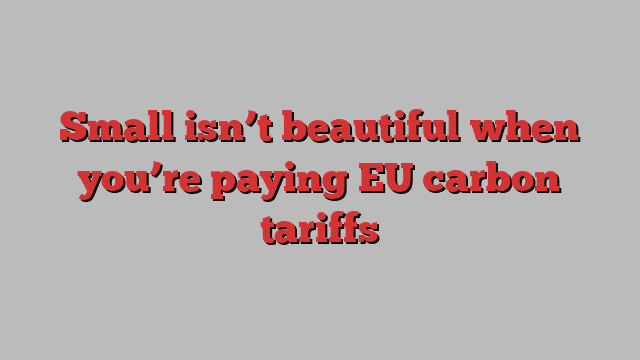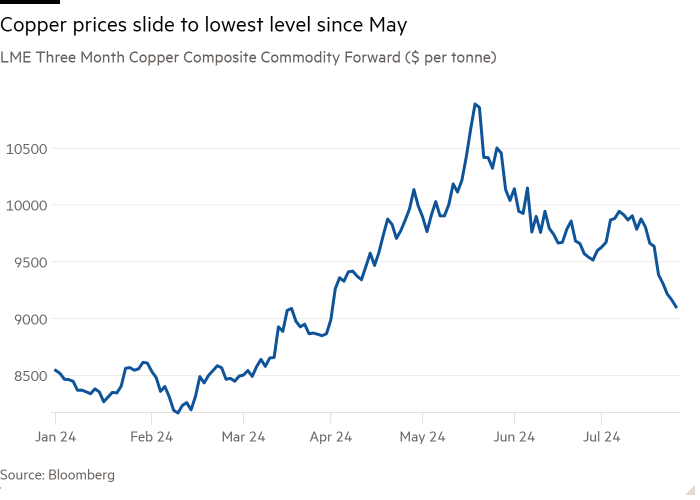
This article is an onsite version of our Trade Secrets newsletter. Premium subscribers can sign up here to get the newsletter delivered every Monday. Standard subscribers can upgrade to Premium here, or explore all FT newsletters
Welcome to Trade Secrets. This morning, my Brussels colleagues have reported on the EU’s cunning plan to deal with a second Donald Trump presidency, deploying the carrot of guaranteed purchases of US exports versus the stick of hefty tariffs. Feels a bit like the Chinese “phase 1” wheeze. If it’s Kamala Harris rather than Trump, by the way, I argued in last week’s Trade Secrets column that the political economy suggests she will keep tariff-and-spend Bidenomics.
Today’s newsletter picks up the theme of climate and trade, specifically the EU’s carbon border adjustment mechanism (CBAM) and its effect on small countries. Charted Waters is on falling copper prices. I’m now off for a two-week break, leaving Trade Secrets in the trusted hands of colleagues Andy Bounds and Alice Hancock. In the meantime, a request. What’s going on in trade and globalisation that I’m not paying enough attention to? Thoughts to [email protected].
Get in touch. Email me at [email protected]
Captured by carbon at the border
A few years ago a fellow economics journalist at the FT said to me: “You do realise that in a few decades everything we write about will be basically irrelevant except for climate change, right?” I think about that a lot, and looking at the terrifying charts of global atmospheric and sea temperatures recently has made me think about it more.
The dim prospects for any kind of negotiated solution to climate and trade puts ever more weight on the EU’s CBAM and its legitimacy and workability. So how’s it going? Better than the EU’s deforestation regulation, certainly, but then that’s a very low bar to clear. Even German companies are struggling to meet the CBAM reporting requirements, amid a general lack of awareness about obligations. Internationally there seems to be quite a lot of acceptance that the EU is acting in good faith, but complaints about the detail.
Those excellent people at the International Institute for Sustainable Development are publishing a series of country studies on the experience of preparing for CBAM, the first two being for Brazil and Trinidad and Tobago.
The latter is a particularly interesting example. Unlike the typical Caribbean country, T&T is classed as a high-income economy thanks to its hefty oil and gas deposits, which it exports directly or uses in energy-intensive products such as ammonia and fertiliser.
The extraction and processing are largely done by foreign-owned multinationals, which you’d expect would be able to cope with the technical measuring and reporting requirements of CBAM. And yet the IISD report found T&T is genuinely concerned that the mechanism is going to take away its business in some very competitive markets.
T&T ranks 15th globally for exports of inorganic chemicals and 23rd for fertiliser. That’s impressive for a country of 1.5mn people. But the countries that dominate the global market are the likes of Canada, the US, Chile, China and Germany, which tend to have more advanced environmental ambitions and regulations — and more renewable energy resources to reduce the carbon footprint of processing.
Sure, you can say “well, tighten up your rules and bring in your own carbon price, job done”. But upgrading the regulatory framework and rejigging production to reduce carbon emissions isn’t entirely straightforward in a small country with relatively limited technical and administrative capacity — and, critically, restricted access to finance.
Not big enough, not poor enough
As I wrote the other week about the EU’s deforestation regulation, the logic of a one-dimensional intervention like CBAM seems clear from Brussels. But for those on the receiving end, it cuts across the multi-faceted challenges of running a country and helping companies comply.
T&T is relatively well-off, but per capita GDP isn’t everything. It’s a member of the nearly 40-strong group of Small Island Developing States (Sids). Often themselves threatened by rising sea levels from climate change, their size and remoteness means they lack economies of scale for regulation, finance and production.
There’s also a serious sovereign debt problem across the group. It was Sids member Barbados that took the lead in the drive for increasing climate finance to low and middle-income countries with the Bridgetown Initiative.
CBAM is technically a tax measure administered by the EU’s tax directorate. The EU trade directorate is also involved, but the issues go beyond it as well.
Jan Yves Remy, director of the Shridath Ramphal Centre at the University of the West Indies in Barbados says: “CBAM is sometimes treated for regulatory purposes just as a tax issue. But, especially for small economies like Trinidad and Tobago, it’s also about trade, investment and particularly finance. We need a joined-up approach where governments are part of discussions while the regulations are being created.”
But the EU isn’t properly set up to have those conversations. Its climate finance ambitions are impressive, but the European Investment Bank, its main vehicle, has a reputation for excessive caution. The EIB says it provided just €660mn in climate finance for the entirety of Latin America and the Caribbean last year. The bank’s website link to its “Caribbean Investment Facility” takes you to “Page not found”.
Remy says: “The small island economies are continually being told we aren’t poor enough or big enough to warrant particular attention”. It’s not the worst fate in the world, but it’s still a tricky place to be stuck.
Charted waters
After a rapid run-up over the first five months of the year, copper prices have recently dropped sharply in anticipation of lower industrial demand from China.

Trade links
-
The EU is attracting criticism by signing critical minerals deals with countries (Serbia, the DRC) that have questionable environmental and human rights records.
-
Turkey is edging towards some sort of monetary and fiscal sanity after the floodgates were opened to help Recep Tayyip Erdoğan’s re-election last year, last week handing back a €5bn deposit that Saudi Arabia gave it to boost its foreign exchange reserves.
-
The FT’s Soumaya Keynes talks with the Peterson Institute’s Adam Posen about how the US gets China wrong. Podcast here, transcript here.
-
The FT’s Martin Sandbu on the need to pre-empt AI innovation with sensible regulation.
-
An essay for the Cato Institute questions the role of tariffs in helping to build American economic dominance in the first one and a half centuries of the country’s existence.
Trade Secrets is edited by Harvey Nriapia today
Recommended newsletters for you
Chris Giles on Central Banks — Vital news and views on what central banks are thinking, inflation, interest rates and money. Sign up here
The State of Britain — Helping you navigate the twists and turns of Britain’s post-Brexit relationship with Europe and beyond. Sign up here